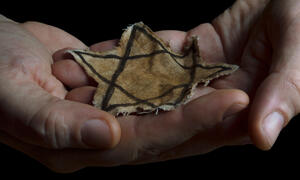503 Results
The 2020 Uprisings One Year Later
May 25 marks one year since the murder of George Floyd, which sparked a pivotal groundswell of activism across the country. As we honor him and all those who have died at the hands of police, we must not waver in our fight against racism and police violence. It’s important that we all center the lived experiences of students and educators of color and support young activists who stand up against racial injustice. These resources help to critically examine anti-racist practices and provide tools to support youth leadership.
- Anti-Racist Work in Schools: Are You in it for the Long Haul?
- Anti-racism: Educators Must Do the Heavy Lifting
- “We Won’t Wear the Name”
2-4-6-HATE

Abraham Lincoln & Frederick Douglass: The Story Behind an American Friendship
Acclaimed Documentary ‘One Survivor Remembers’ Urges All to Never Forget

Acknowledging Hidden Bias
In May 2018, more than 175,000 Starbucks employees stopped work to talk about racism, discrimination and implicit bias. These discussions might be happening at Starbucks, but we know they need to happen elsewhere, too. Here are some resources on implicit bias to help you look inward, then start a conversation of your own.
- Tackling Implicit Bias
- Is Implicit Bias Racist?
Acknowledging the Inconvenient Truths of Bias and Erasure
Analyzing whose perspective is centered and whose is erased in significant conversations and spheres of influence paints a clear picture—an inconvenient truth— about the pervasiveness of systemic racism. And it’s particularly important that Black children see themselves represented in these narratives—especially in those spaces where Black people are intentionally rendered invisible. These LFJ resources highlight what’s at stake in the choices we make.
- Black Visibility Matters: The Inconvenient Truths of Bias and Erasure
- It Has Stayed With Me
- Use the Tools of Science to Recognize Inequity in Science
Addie Mae Collins, Denise McNair, Carole Robertson, & Cynthia Wesley
Addressing Anti-Asian Bias
Amid the pandemic, Asian American people continue to experience racism, violence and harassment. These resources can help you teach the historical precedents for this moment, introduce ways for students to recognize and speak up against coronavirus racism, and start conversations with even the youngest learners about recognizing and acting to address injustice.
- Min Jee’s Lunch
- Speaking Up Against Racism Around the Coronavirus
- How to Respond to Coronavirus Racism
